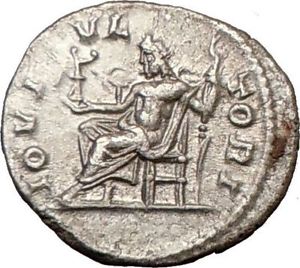The Roman Yahweh
The Roman iove. This is dated physical evidence Classical Latin iove

Information on the coin. SEVERUS ALEXANDER 225AD Silver Ancient Roman Coin JUPITER. A search for this coin shows it is inexpensive and easy to acquire..
Severus Alexander, Roman Emperor 222–235 on the reverse of the coin. Severus Alexander became emperor when he was around 14 years old, making him the youngest emperor in Rome’s history, until the ascension of Gordian III. The Roman army hailed Alexander as emperor on 13 March 222, immediately conferring on him the titles of Augustus, pater patriae and pontifex maximus.
The chief god of the Ancient Romans is known to us today as Jupiter, King of the Gods. In English it is Jove (Strong’s concordance G2203 showed us this) and in classical Latin it is spelled iove and pronounced YaHWeH.
Critical to understanding that Jove is related to Jupiter is Jovian Theology and The Iguvine Tablets.
If we check a pronunciation chart of classical Latin in a book called Vox Latina, which is one of the most respected and authoritative books on the pronunciation of classical Latin, this is what we find:
The “i” is pronounced as a double “EE” sound as in the word sheep.
The “o” is pronounced as a “AH” sound as in the word father.
The “v” is pronounced as a “W” as in the word w-hale.
The “e” is pronounced as “EH” as in the word pet.
If we put the sounds together EE + AH + W + EH it pronounces YaHWeH. The EE sound + AH sound = iYaH and W + EH = Weh. Put the two sounds together and it pronounces YaHWeH spelled iove in classical Latin.
In classic latin Jupiter is Iuppiter (“father sky god”) the king of the gods in Roman mythology.
The Roman Yahweh
Jupiter (Latin: Iuppiter) is the king of the gods in Roman mythology. He was the god of the sky and thunder. He is known as Zeus in Greek mythology.
The sanctuary at Mount Gerizim, not far away from Neapolis, is even younger than the city. It was erected as late as Hadrianic times. As location Hadrian chose an ancient sacred site that played an important role already in the Old Testament as Mount of Blessings. Deut. 27.2 tells of Joshua calling the Israelites partly to Mount Gerizim to bless the people, partly to Mount Ebal to curse it. The main sanctuary of the Samaritans lay at the very spot; as late as the early 20th century, the fathers of the families went there every year to slay their sacrificial lamb for Passover. This original sanctuary was dedicated to Zeus Xenios or Hellenios in 168 B. C. by Antiochos IV, who drove the Jews into a rebellion with his radical policy of Hellenization without regard for the Jewish faith.
Hadrian, also spelled Adrian, Latin in full Caesar Traianus Hadrianus Augustus, original name (until 117 CE) Publius Aelius Hadrianus, (born January 24, 76 CE—died July 10, 138, Baiae [Baia], near Naples [Italy]), Roman emperor (117–138 CE), the emperor Trajan’s cousin and successor, who was a cultivated admirer of Greek civilization and who unified and consolidated Rome’s vast empire. He was the third of the so-called Five Good Emperors.
Hadrian drew on that. He, too, tried to bind Judaea Province closer to the Roman Empire by hellenizing the Jewish culture. To achieve that, he had a big temple site built on Mount Gerizim in honor of Zeus. In order to make clear that this sanctuary was intended to replace the destroyed temple in Jerusalem as cultic center, the doors of the old temple were brought on as decoration of the new one. The epithet of the Zeus worshipped here, Hypsistos (= the Most High), betrays Hadrian’s well-intentioned attempt to merge Hellenistic-Roman ideas with the monotheism of the Samaritans here.
According to Moore, George Foot (1911). 311 “Jehovah” in Encyclopædia Britannica, Volume 15, 11th ed, the Samaritan priests have preserved a liturgical pronunciation “Yahwe” or “Yahwa” to the present day, that is 1911.
More Yahweh snares.